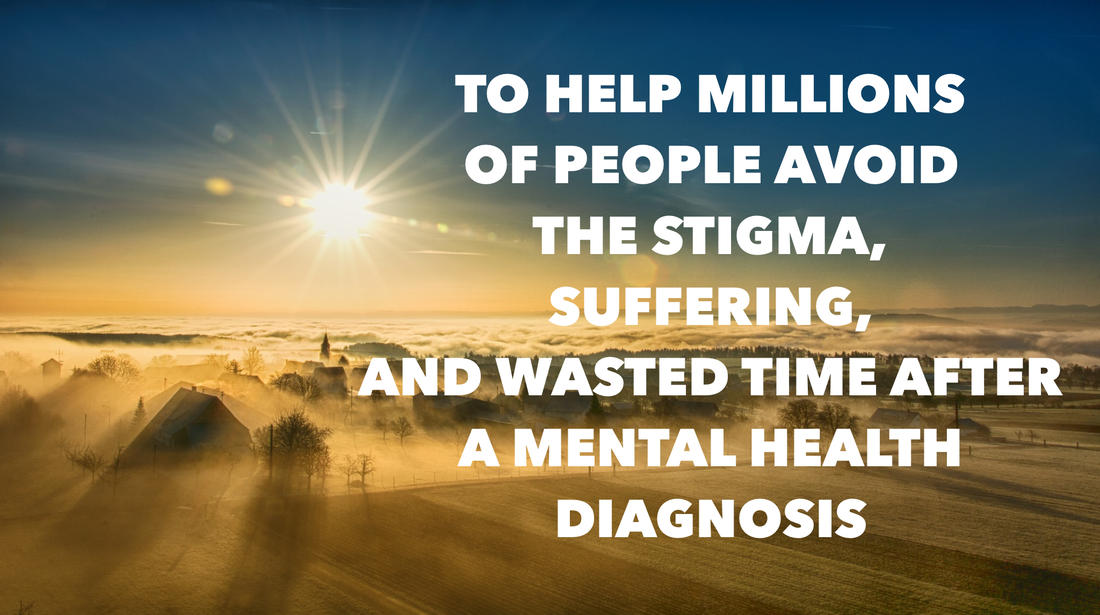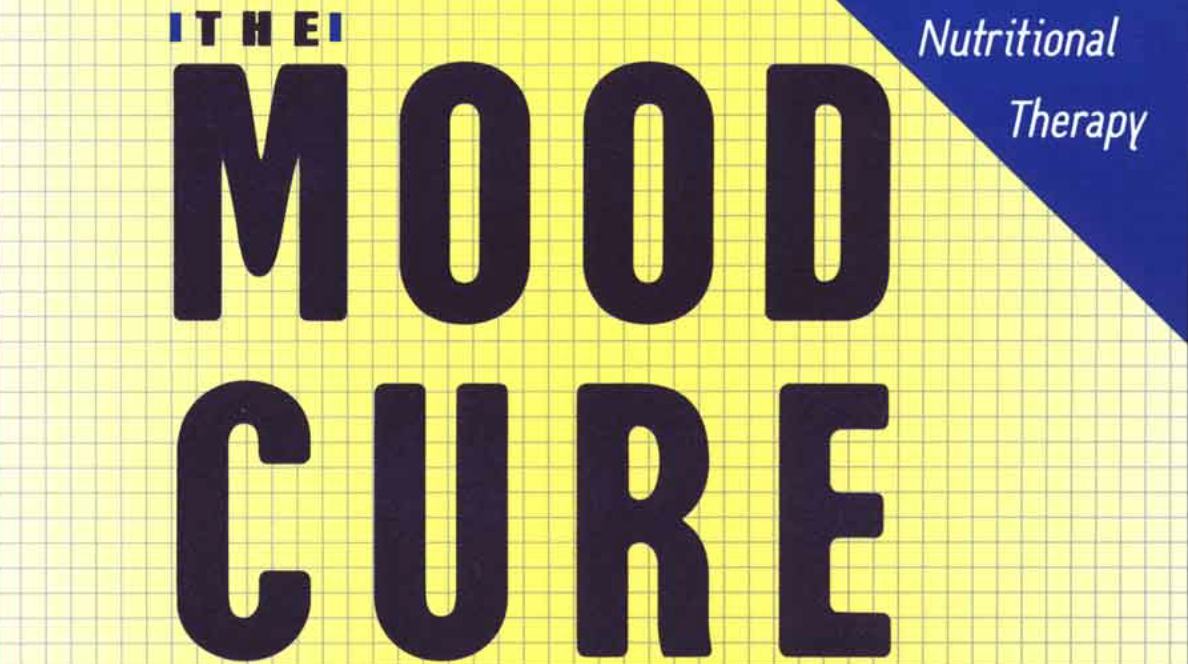|
I recently read the awesome book, Start With Why by Simon Sinek. In brief, all great companies or causes have a clear purpose, they start with why are we doing this?
So here's my story, why I founded Wellia. Here's why I have a (healthy) obsession with this business and its mission, why I happily lose myself in social media discussions about health, wellness and recovery. This is why I'm lost in happiness and purpose while producing the videos on mental wellness on this website. Because I want to help millions of people avoid the stigma, hellish suffering, and wasted time that I endured after a mental illness diagnosis. When I was 35 years old, I was diagnosed with a mental health condition, allegedly incurable. I spent the next 10 years toxically overmedicated, and suffered through a fog of depression and fear. Every facet of my life - health, happiness, family, career and finance - went backwards. But I recovered, and here's what I learned - 4 keys to recovering and restoring your mental wellness: 1. Understand Healing Is Possible - When the reality of my diagnosis sank in, I lost hope. But I'm living proof that - even with the most pernicious of diagnoses - recovery and healing are possible. I've been medication-free for years, have no symptoms, and professionals and friends alike describe me as in full remission: cured. This is possible. If you get an infection, for example, there was a time before the infection, when you were well. It’s often the same with mental health - there was a time before anxiety, depression, bipolar etc. - and thus it’s possible you can be restored to your previous, healthier state What if you have a family history of mental illness, addiction or more? I do - disorders and addictions run in my family. But according to recent research, genetics account for about 25% of mental health risk. The other 75% is lifestyle - and that 75% is how I healed. 2. Avoid Side Effects - I don’t want anyone ever again to endure the awful side effects of psychiatric medication. My side effects included weight gain, mental dulling, increased mood swings, impaired judgment, suicidal ideation, depression, and more. Today I actively manage my mood, but without drugs. I do this through - body, mind and spirit. My treatment includes exercise, healthy diet, supplements, spiritual practice and more. And here’s the great news - high protein diet, yoga, Omega 3s, meditation - none of these have any side effects! 3. Recognize Your Strengths - For years, I felt defined by my diagnosis - I'm bipolar. But I am not my disease, and you are not your disease. And with time, I realized there are two sides to every coin. Bipolar is often associated with intelligence, energy, creativity, problem-solving and more. Today I embrace and live my strengths, and manage my weakness through daily lifestyle choices. People with depression often have strong feelings - which can be a strength. People with anxiety tend to be very bright and intelligence is a gift. Try searching a list of famous people with anxiety, depression, bipolar, etc. and you’ll find you're in good company! 4. Heal the Underlying Disease - Everything happens for a reason. My illness was precipitated by a series of unresolved problems and overwhelming stress: a toxic relationship, spiritual malaise, and financial and work stress. My decision to take Depakote did not fix these problems, or ease my stress. When someone is diagnosed with a mental illness, it's essential to seek to understand the underlying triggers and reasons. In most cases, no pill is going to fix those underlying causes. Note: there is a time and place for psychiatric medications - they can save lives. But you can recover from anxiety, you can be healed from depression or bipolar. Hopefully for most people, psychiatric medication - like antibiotics - can be a short-term intervention, rather than the long-term solution. So what about you?
3 Comments
Anxiety is increasing at a worrying rate. Today it’s the number one mental health condition, affecting 18% of the population, or nearly 1 in 5 people. Anxiety can vary in duration and intensity. It ranges from someone with occasional worrying thoughts, all the way to a chronic, debilitating anxiety disorder that's clinically diagnosed. Everyone is different, and you’ll need to try different remedies and discover which combination works best for you. Here are some mind, body and spirit remedies for anxiety, including vitamins, exercise, mediation and more. Mind Challenge Your Thoughts - anxiety often originates in thoughts. You think you might lose your job. You're worried that a relationship might end. Try challenging your thoughts. For many people, most worrying thoughts never come true. So ask yourself: what happened when I worried like this in past? Chances are, in most cases, everything turned out fine. Worst Case Scenario - in his excellent book Quiet Your Mind, John Selby writes he often has patients wth anxiety envision the worst-case scenario. Okay, you lose your job, the relationship ends. Now what? Chances are, you'll find another job, someday you'll be in another relationship. Life is constant change. And perhaps that new job or relationship will be even better. Body Exercise More - one remedy that will help you feel more calm is to exercise more frequently. In his groundbreaking book Calm Energy, Robert Thayer notes that the single best antidote to anxiety is exercise. The most effective work out is cardiovascular, such as running, cycling, swimming, or brisk walking. Yoga is also excellent for feeling more calm. Eat Protein - millions of people start their day eating solely breakfast cereal. By the time lunch rolls around, chances are they've gone 18 hours without any protein. Protein - especially meat, fish and eggs - contains amino acids. Those are the building blocks of neurotransmitters, which help keep you calm and focused. Vitamins - there are a number of vitamins that are particularly good for anxiety, as explored in The Mood Cure by Julia Ross. I've had great success with GABA, the primary neurotransmitter for calming the nervous system. Also, many people with anxiety suffer from a deficiency of magnesium, so taking a magnesium supplement, especially at bedtime, can be very beneficial. Spirit Meditation - a meditation practice can also be helpful in feeling more calm. A recent study indicates that people with anxiety can get relief after a single meditation session. Meditating regularly is even better, as it calms the nervous system, and quiets the mind. Meditation helps you become more aware of your thoughts, so you can challenge them (see above) Breath Exercise - practices such as alternate nostril breathing can also be very helpful. Breathing also calms the central nervous system. The awesome thing about breathing exercises is you can do them anytime, anywhere. What about you? What are your best natural remedies for anxiety - mind, body and spirit? About a decade ago, I was talking with a friend, who had a mental health disorder. I asked him what medication he took. “I don’t take medication,” he replied. “I’ve found a different path that works better for me.” Tim then mentioned the book The Mood Cure, by Julia Ross. This was a life-changing moment for me, and it might be for you too. The title of Ross’s excellent book is misleading, because the book’s wisdom can be helpful to just about anyone, not just people diagnosed with mood disorders. (What exactly does mood mean?) In brief, her book explores how to use supplements, as well as improvements in diet, to remedy what she calls four “moods”:
Have you ever felt down, stressed or scattered? Well then this book is for you The Mood Cure devotes a detailed section on each of the above four moods. Ross then outlines vitamins and supplements to remedy the ailment, as well as changes in diet. Using supplements and diet to improve your mood and focus will further explored in our new video series on mental wellness. What’s really awesome, is she generally recommends vitamins and supplements as a stop gap, as you transition to a healthier diet. So you fix your mood by improving your diet… Generally, Ross’ diet recommendations focus heavily on increased protein. That’s not surprising, as most people with mood or cognitive issues suffer from neurotransmitter deficiencies. Neurotransmitters are the magic brain chemicals that make you happy and focused; a deficiency of these will make you more prone to depression, stress and lack of focus. She also advocates for animal protein: meat, fish and eggs, as those are only foods that contact all amino acids, the building blocks of neurotransmitters. Ross also advises against what I’ll call the freaky five:
I’ve cut all of those ingredients out of my life, which is surprisingly easy, and my health and wellness is better than ever before. Friends tell me that I look 10 years younger today, than I did 10 years ago (check out my YouTube videos to see how active I am at age 54!) Also, I rarely feel depression or stress. And although I’m ADHD out the yin yang, I’ve been able to tap into hyper focus and lead a highly productive life (like founding Wellia and other businesses). Julia Ross’ book is absolutely one of the most important and life-changing books I’ve read, which I further explore in my video review of the Mood Cure book. The book has blessed with me astonishing health and vitality, and profoundly changed my life. It might change your life too. In a Word: Mood.
Mood is one of those words that’s bandied about casually, its definition varies broadly. “The boss is in a bad mood,” coworkers confide. “I’m not in the mood,” a wife tells her husband. The dictionary defines mood as “a state or quality of feeling at a particular time.” On a bad day, it’s “a state of sullenness, gloom, or bad temper.” But what’s really interesting is what the word – which comes from Old English – originally meant…mind and spirit. Etymology is always revealing. As our world changes, millions of people increasingly find themselves mood-challenged – or flat out in a bad mood, depressed, etc. From the economics stresses to the vertigo-inducing acceleration of modern life, we increasingly face physical and mental stressors, and this affects our mood: mind and spirit. The ancient Greeks had their act together – they strived for mind/body/spirit wellness. Body is important. For example, diet and nutrition have a huge impact on mood. Today, millions of us focus primarily on body: for example, cosmetic surgery is a much bigger business than meditation instruction. How much are we investing, say, in mind? How much are we monitoring our thoughts, where they come from (often childhood nasties), and their effect on our mood and behavior today? Meditation is a great way to increase this awareness. Or what about spirit? For many, a rote weekly visit to church, temple, etc. is supposed to cover that. Ned Flanders. Again, the original meaning of the word spirit is equally revealing; it comes from Latin, and means breath. This can be interpreted to mean anything from meditation – which centers around breath – to exercise or the outdoors. I once read that with every breath we take, we breathe at least molecule that every other human being on Earth has or will breathe; I don’t know whether this is true or not, but at least symbolically breathing – spiritus – connects us with all other living beings. To enjoy a good mood – today and everyday – be mindful of the origin of mood. Take good care of your mind and spirit, and your mood will take good care of you. Get more tips in Feel Good, our upcoming video exploring natural remedies for depression. |
AuthorErich Toll, founder, Wellia.com Archives
April 2019
Categories |
About |
Videos |
|





 RSS Feed
RSS Feed